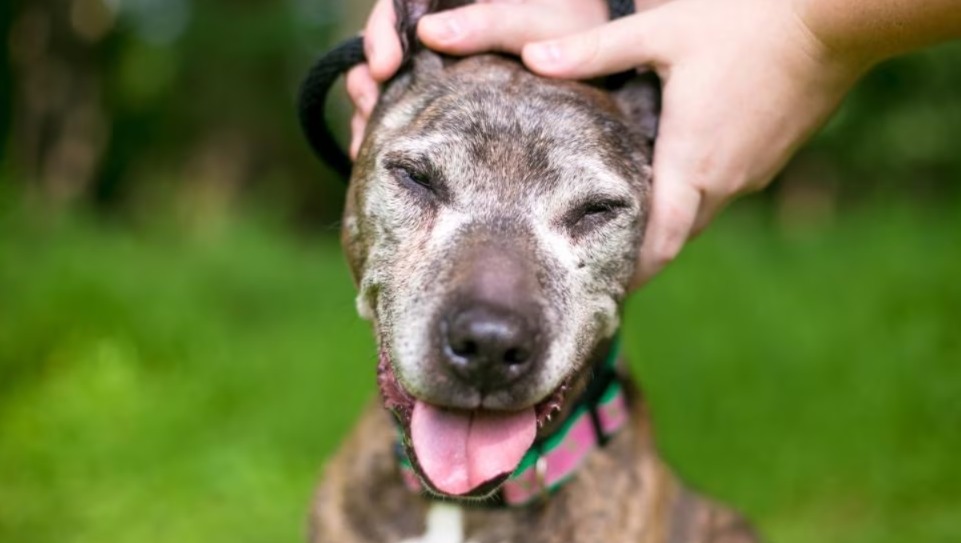
Dogs age. Their bones creak, their appetite flickers, their ears dull, their spirit stirs more slowly. But aging isn’t a death sentence—it’s a new chapter.
And how you show up for your dog in that chapter makes all the difference.
Let me tell you how to make those “senior years” as gentle, dignified, and loving as possible.
First: Know When “Senior” Begins
Big dogs age fast. A Chihuahua may not be “senior” until 10 or 11, while a Great Dane might already be considered senior at 5 or 6. It’s not just about calendar years—it’s about signs.
When your dog starts stiffening, slows down, or visits the vet more often, that’s your cue.
Don’t wait for obvious decline. Start shifting your care before serious problems set in.
Diet: More Than Just Lower Calories
As metabolism slows, too many calories become weight gain—and weight aggravates joint pain, heart stress, and more.
Choose a high-quality, AAFCO-approved senior formula (or a prescription diet if your dog has kidney, liver, or other chronic conditions).
But don’t skimp on protein if your dog is losing muscle; some older dogs need more digestible protein to hold on to lean mass.
And be cautious with sodium, phosphorus, and fat depending on your dog’s health.
Transition slowly—mix in the new food over 7–14 days. Upset stomachs are common if you switch too fast.

Exercise & Movement: Gently, but Consistently
Yes—you still need to move. But the game changes. Your senior dog needs low-impact, joint-friendly exercise: gentle walks, swimming, or slow paced play.
Aim for 30 to 60 minutes daily, adjusted for mobility and comfort.
But watch for signs of pain: limping, hesitation, reluctance to climb stairs—that’s your “slow down” warning.
Use ramps, non-slip mats, and soft bedding so your dog doesn’t struggle just getting around.
Massage, gentle stretching, and joint supplements (glucosamine, chondroitin, omega-3s) may help. Always check with your vet.
Health Monitoring: Catch Issues Early
Here’s a truth: many health problems in older dogs creep in silently. So proactive checks are your superhero move.
Biannual Vet Visits
Once a year isn’t enough anymore. As dogs age, checkups every six months help catch thyroid issues, kidney disease, diabetes, and more.
Bloodwork & Urinalysis
Get a full blood panel, chem screen, thyroid test, urinalysis—these help detect things like kidney or liver disease before they become critical.
Dental Health
Don’t neglect the mouth. Tartar, gum disease, loose teeth—it all hurts and can contribute to systemic disease. Brush daily and get cleanings as needed.
Lumps, Vision, Hearing
Check their skin often: new lumps, changes, swellings need vet evaluation. Eyes get cloudy; hearing dulls. Don’t rearrange the house randomly—your dog needs familiarity to move safely.
Weight Changes
Too thin or too heavy? Both are red flags. Adjust food and activity accordingly and keep your vet in the loop.
Cognitive Dysfunction
Yes—dogs can get “dog dementia” (CCD). If you notice confusion, pacing, nighttime restlessness, losing house training—talk to your vet. Mental enrichment matters.

Comfort & Quality of Life
Orthopedic beds: softer, more supportive surfaces reduce joint stress.
Easy access: add ramps to couches or cars, place food & water bowls on stable, non-slip surfaces.
Routine & predictability: older dogs thrive when daily life is consistent. Big changes stress them.
Mental enrichment: puzzles, sniff games, slow food feeders—keep their brain engaged.
Grooming help: help them with brushing, nail trims, and bathing; they may not reach as easily.
Affection: never underestimate the power of a gentle belly rub, ear scratch, or calm talk. It communicates love and security.
When It’s Time to Reevaluate
There may come a time when what’s best isn’t pushing forward, but making them comfortable.
Watch for persistent pain despite treatment, loss of joy, the inability to walk even short distances, or more bad days than good ones.
Discuss with your vet and your heart.
Final Word
Taking care of a senior dog isn’t about training or control—it’s about respect, adaptation, and deep compassion.
It’s listening to their weaknesses and building supports. It’s turning invisible struggles into visible tenderness.
You’re not just giving them time—you’re giving them dignity, comfort, and love.
Because when their muzzle grays, their heart doesn’t have to fade. You can still make the years golden.



